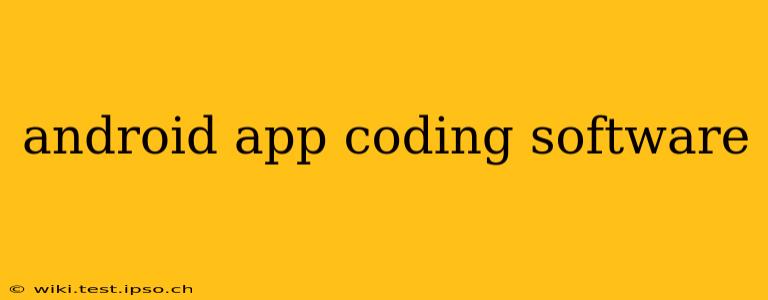Developing Android apps requires the right tools. This comprehensive guide explores the essential software and platforms you'll need, addressing common questions and providing insights to help you build your next successful Android application.
What Software Do I Need to Code Android Apps?
The primary software you'll need is Android Studio, the official Integrated Development Environment (IDE) from Google. Android Studio is a powerful, feature-rich platform specifically designed for Android development. It includes everything you need, from code editing and debugging to building and deploying your app. It's free and available for Windows, macOS, and Linux.
What Programming Languages Are Used for Android App Development?
While Android development has historically relied heavily on Java, Kotlin has become the preferred language. Kotlin is a modern, concise, and safer language that interoperates seamlessly with Java. Many new Android apps are built using Kotlin, and Google officially supports it. While you might encounter some older Java-based projects, learning Kotlin is the recommended approach for new Android app development.
Is Java Still Relevant for Android Development?
Yes, Java remains relevant, particularly for legacy projects. However, new projects are increasingly leveraging Kotlin's advantages. Understanding Java can still be beneficial, especially if you're working with older codebases or libraries.
What Other Tools Are Useful for Android App Development?
Beyond Android Studio and the choice of programming language, several other tools can significantly enhance your development workflow:
- Version Control Systems (like Git): Essential for managing your codebase, collaborating with others, and tracking changes. GitHub, GitLab, and Bitbucket are popular platforms.
- Emulators and Simulators: These allow you to test your app on various Android devices without needing physical hardware. Android Studio includes an emulator, but other options exist.
- Testing Frameworks: Robust testing is crucial for creating high-quality apps. Android Studio integrates with various testing frameworks to ensure your app functions correctly.
- UI Design Tools: Tools like Figma or Adobe XD can help you design and prototype your app's user interface before coding.
What Are the Best Practices for Android App Development?
Effective Android app development involves following best practices to ensure efficiency, maintainability, and a positive user experience:
- Clean Code: Write well-structured, readable, and maintainable code.
- Modular Design: Break your app into smaller, manageable modules.
- Testing: Thoroughly test your app throughout the development process.
- Security: Implement appropriate security measures to protect user data.
- Performance Optimization: Optimize your app for speed and efficiency.
Can I Code Android Apps on My Phone?
While you cannot build and deploy a full Android app directly on your phone, there are tools and platforms offering limited coding capabilities on mobile devices for educational purposes or simple projects. These aren't replacements for a full IDE like Android Studio.
What Are the System Requirements for Android Studio?
Android Studio requires a reasonably powerful computer. Check Google's official documentation for the most up-to-date system requirements, as these can vary with each release. Generally, you'll need sufficient RAM (8GB or more is recommended), a relatively modern processor, and ample disk space.
This guide provides a foundation for understanding the essential software and best practices for Android app development. Remember to stay updated with the latest advancements and tools in this dynamic field. Happy coding!
